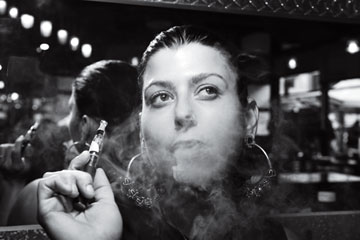
(2 of 7)
The challenge for regulators is this: e-cigarettes offer the first realistic chance of escape from the most exquisite and deadly delivery device for nicotine ever invented, the combustible cigarette, which kills more Americans annually than AIDS, car accidents, illegal drugs, murders and suicides combined. But we know little about the health effects of e-cigarettes, and there is a real fear of unintended consequences. Public-health experts have spent years stigmatizing smoking and making it as inconvenient as possible, scrubbing it from popular culture and public places. E-cigarettes, with their sexy marketing and aura of safety, might reglamorize smoking, discouraging smokers from quitting and, worse, enticing nonsmokers to start. The coming regulations are likely to consolidate the market, weeding out small players and favoring big companies that can afford to comply. The ones that survive might actually transform the way the world smokes.
After losing his father to lung cancer, Hon Lik, a Chinese pharmacist--who, like more than 50% of the men in his country, smokes--wanted to invent a safer way to get his nicotine. It took a couple of years, but in 2003 he won the first patent for the electronic cigarette--a device that heated and vaporized a liquid made of pure nicotine, water, flavoring and propylene glycol, the chemical used to make stage fog. Today his company, Ruyan, has sold more than a million electronic cigarettes, and China is the biggest producer of electronic cigarettes and liquid in the world. But key competitors have emerged in the U.S. as demand grows for American-made e-cigarette liquid.
A few years later and across the world, a 35-year-old Apple Store manager near Milwaukee by the name of Christian Berkey learned about electronic cigarettes from a news story. A 2½-pack-a-day smoker and something of a tech nerd, he ordered one over the Internet. He was delighted by how closely using the electronic cigarette resembled smoking--the soothing hand-to-mouth motion, the familiar tingling sensation at the back of his throat as he inhaled the vapor and the plume of "smoke" that appeared when he exhaled.
There was only one problem: it tasted awful. At the time, he says, all e-liquid tasted like chemicals and came from China in plastic bottles with sketchy markings. Determined to make a liquid he could actually use, Berkey began hoarding cigarette, cigar and pipe tobacco from wherever he could get it. Every minute that he wasn't working at the Apple Store, he was in his kitchen experimenting. He tried using a double boiler to warm the tobacco into a paste and lining up five coffeemakers on his kitchen counter to brew a "tobacco reduction." After nine months, he discovered a secret method that produced something great. He called it smoke juice.
On July 25, 2008, Berkey launched a crude website. He had 307 orders in the first 12 hours. Two weeks later, he says, he realized he had made more money in a week than he did in a month at the Apple Store. So he quit his job, cashed in his 401(k) and named his new business Johnson Creek. It racked up $510,000 in revenue in the first six months.
